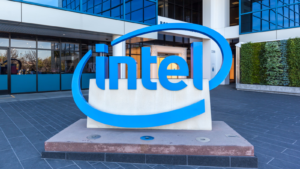
This article is an excerpt from the InvestorPlace Digest newsletter. To get news like this delivered straight to your inbox, click here.
Last week, I revealed a list of the five top “moonshot” artificial intelligence (AI) stocks from across InvestorPlace.com.
Not only are these elite companies the leaders in their field, but their relatively low valuations also make them far likelier to succeed.
As the 1999 tech bubble reminds us, it’s the smaller startups and turnarounds that end up trouncing the incumbents. (Consider how underdog Apple (NASDAQ:AAPL) outperformed blue-chip Cisco (NASDAQ:CSCO) during that period!)
But not every investor can shoulder the volatility of the riskiest moonshot bets.
Companies like C3.ai (NASDAQ:AI) and Sabre (NASDAQ:SABR) from last week’s letter are highly unprofitable. Meanwhile, those like GitLab (NASDAQ:GTLB) will require years of hypergrowth to reach their full potential.
Buying only a few shares of these moonshot companies limits the potential profit to investors.
That’s why I’m revealing another five artificial intelligence bets from our writers at InvestorPlace.com.
These firms are mostly larger, have lower volatility, and are still benefiting from artificial intelligence tailwinds.
5 AI Stocks Poised for Growth: Adobe (ADBE)

Adobe (NASDAQ:ADBE) presents a challenge for investors. The graphics software firm is highly attractive for its profitability. Its 20% return on capital invested (ROIC) makes it five times more profitable than Amazon (NASDAQ:AMZN) by that metric.
But on the other hand, the company’s high quality comes with an equally high stock price.
Shares of the California-based firm trade at 32X forward earnings, well above the 20X median for all S&P 500 companies. The average Wall Street analyst gives Adobe only a 5% upside relative to current prices.
Fortunately, this will change as Adobe’s AI offerings grow.
As Samuel O’Brient notes in his recent article “25 Millionaire-Maker AI Stocks to Buy Now:”
The AI boom should give investors and analysts even more reason to embrace ADBE stock…
It is incorporating generative AI into its well-known products [which] will likely make it an even more popular tool among graphic design professionals and other creatives who depend upon it.
That will put Adobe on a new growth path.
Media firms are increasingly turning to generative AI to help create content, and Adobe’s lead in the industry gives it a distinct advantage over competitors like Avid Technology (NASDAQ:AVID) that have fewer AI capabilities.
As AI adoption accelerates, so too will Adobe’s ability to grow.
2. Intel (INTC)

“No words can portray or explain the historic collapse of Intel,” David Moadel noted in a recent article.
America’s largest chipmaker – Intel (NASDAQ:INTC) – is now expected to generate only $2.46 billion in profits this year, down from $21 billion in 2019. Intense competition from Advanced Micro Devices (NASDAQ:AMD) is also keeping prices low, especially in server-related chips.
Still, Moadel suspects that Intel is about to turn a corner:
Opportunities to ride along with a zero-to-hero stock don’t come along every day. The sentiment surrounding Intel is tepid at best right now. However, that could instantly change.
That’s because Intel is quietly pushing ahead with AI applications.
Last week, the firm announced it would offer 34 open-source AI reference kits, the result of a years-long collaboration with consulting firm Accenture (NYSE:ACN). The firm also plans on introducing chips specific to AI use by 2025, codenamed “Falcon Shores.”
Intel announced better-than-expected earnings on Thursday, July 27, suggesting that its cost-cutting measures are finally working.
Most importantly, Intel’s cheap share price leaves plenty of room for upside.
Shares of the struggling chipmaker are down 50% since 2021 and only trade at 16X 2025 earnings.
If Intel succeeds in turning its business around, it could look much like Apple in the early 2000s: A fallen giant ready to surge again.
3. Meta Platforms (META)

In February, Luke Lango suddenly turned bullish on Facebook parent Meta Platforms (NASDAQ:META) and other big-tech stocks:
Now’s the time to buy Big Tech stocks. That’s just what you do with long-term winners. You sell them when they are overhyped and undervalued. You buy them when they are underappreciated and undervalued.
It was a tactical trade. Big-tech firms had just sold off, and their valuations had become irresistible.
This week, Dana Blankenhorn joined Luke in recommending Meta, thanks to the tech giant’s newfound strength in artificial intelligence:
Meta’s efforts in generative artificial intelligence (AI), where it has open-sourced key technologies, are also a contrast to other [cloud companies], which have urged government regulation to control the software…
Its dominant position providing free services in the developing world has proven more powerful than any missteps with Threads or the metaverse. I admit I underestimated it.
Meta also recently announced it would give its “Llama 2” large language model away for free, upsetting a standing rivalry between OpenAI and Google. This now puts Meta in the running for AI applications.
Finally, Meta’s shares remain inexpensive compared to other “Magnificent Seven” stocks.
The company trades at 19X 2025 earnings, well below Microsoft (NASDAQ:MSFT) at 26X, Apple at 29X and Amazon at 49X.
Though the firm has less upside than last week’s “moonshot” picks, Meta’s stability and constant cash generation makes it a safer bet on AI than most.
4. Palantir (PLTR)

In 1994, consulting firm Accenture formed its Business Process Management unit to help companies outsource work.
It was a hit.
Within a decade, the management consulting firm had transformed into a service company focused on implementation. Today, Accenture is a $200 billion behemoth in tech and cloud-based outsourcing.
Palantir Technologies (NYSE:PLTR) could soon walk the same path.
The $36 billion data analytics company focuses on helping governments and large enterprises manage, secure and analyze data. If the U.S. Army needs help creating an AI-enabled system, they’re more likely to turn to Palantir than attempt to build one from scratch.
This week, Faisal Humayun writes how he expects bullish momentum to be sustainable for Palantir and that AI applications could add further growth. InvestorPlace.com writer Larry Ramer also notes that well-respected analyst Dan Ives now calls Palantir an “unmatched… AI fortress” and has a $25 price target.
That said, Palantir still has a lot of work to do in AI.
The company doesn’t yet have deep in-house AI capabilities. Its platforms mostly involve data gathering and analysis. Ramer also notes how he has “seen no evidence of Palantir investing a significant amount of funds in developing AI before 2023.”
Nevertheless, Accenture’s experience shows that it’s not always necessary to have every platform in-house. If Palantir can develop its sales teams to mirror those of consulting firms, Dan Ives’ bullish calls will likely prove correct.
5. DigitalOcean (DOCN)

Finally, Bret Kenwell writes this week how DigitalOcean (NYSE:DOCN) is now a “buy” following its acquisition of Paperspace, an AI cloud computing startup.
Here’s how CEO Yancey Spruill explains the acquisition:
The demand for AI/ML cloud solutions has witnessed an unprecedented surge, fueled by the emergence of large language models (LLMs)…
Together, DigitalOcean and Paperspace will unlock opportunities… [that will] delve into AI/ML applications such as generative media, text analysis, natural language understanding, recommendation engines, and image classifications.
Even before the acquisition, DigitalOcean was a highly cash-flow positive firm. The New York-based company helps small and medium-sized businesses migrate to the cloud with virtual private servers (VPS). These scalable servers are a profitable business. Analysts were already expecting a strong $173 million profit in 2023.
The move into generative AI now gives DigitalOcean greater room for growth, especially if demand for pretrained systems begin to rise.
Kenwell currently has a $44-$45 floor price target on DOCN and expects shares to rise as high as $53 in the near term.
The AI Revolution Is Here
In 1983, the Pew Research Foundation found that middle-income families held 32% of U.S. wealth.
Fast forward to today, and everything’s changed. Middle-income families now own 17% of wealth and earn less than half of the country’s aggregate income.
Meanwhile, the share owned by upper-income families has skyrocketed to almost 80%, turning America into a land of “haves” and “have-nots.”
Eric Fry calls this the Technochasm.
It’s a widening gulf between those who have benefited from technological change and those that have suffered or even been replaced.
The trend is accelerating with artificial intelligence. We’re seeing thousands of jobs getting replaced by generative AI. International Business Machines (NYSE:IBM) alone has already announced 7,800 cuts.
And the better that artificial intelligence gets, the faster the trend will happen.
That’s why Louis Navellier, Eric and Luke teamed up and held the AI Impact Event on Thursday.
During the event, they discussed the consequences of AI rapid adaptation… and the huge opportunity that we have if we act right now.
Plus, Louis, Eric, and Luke shared how investors can position themselves to prosper.
If you missed the event, you can catch the replay here.
As of this writing, Tom Yeung did not hold (either directly or indirectly) any positions in the securities mentioned in this article. The opinions expressed in this article are those of the writer, subject to the InvestorPlace.com Publishing Guidelines.




